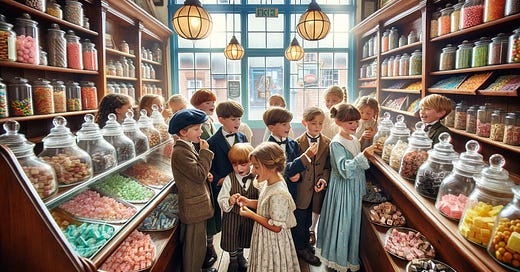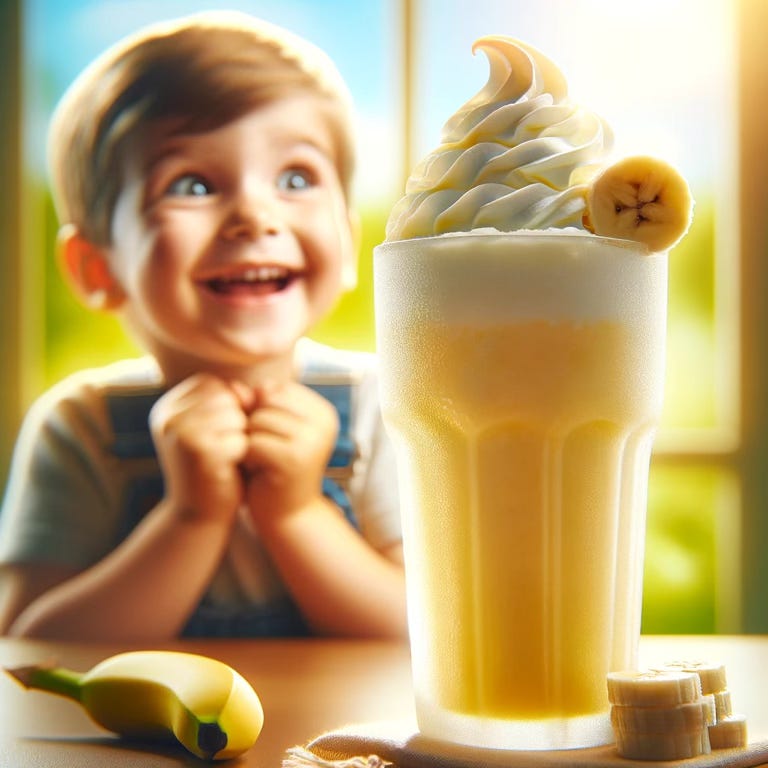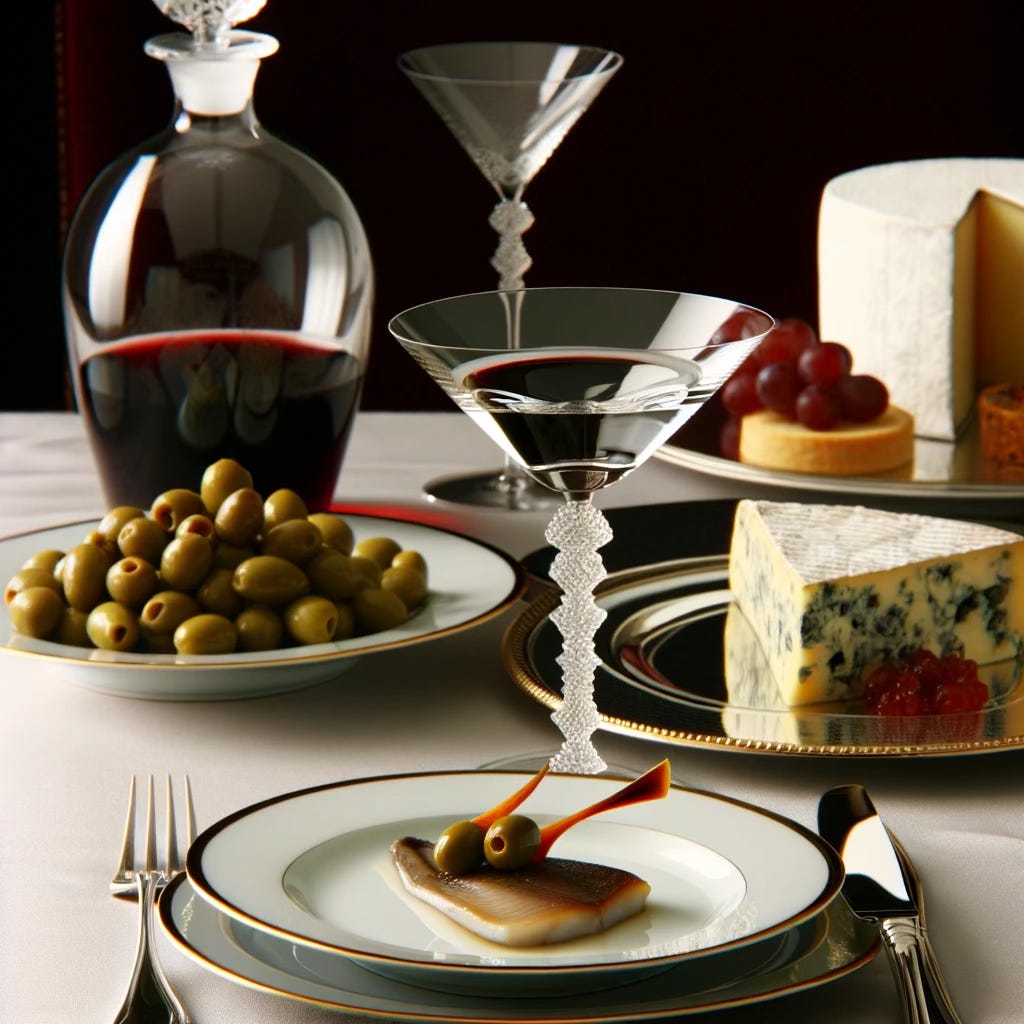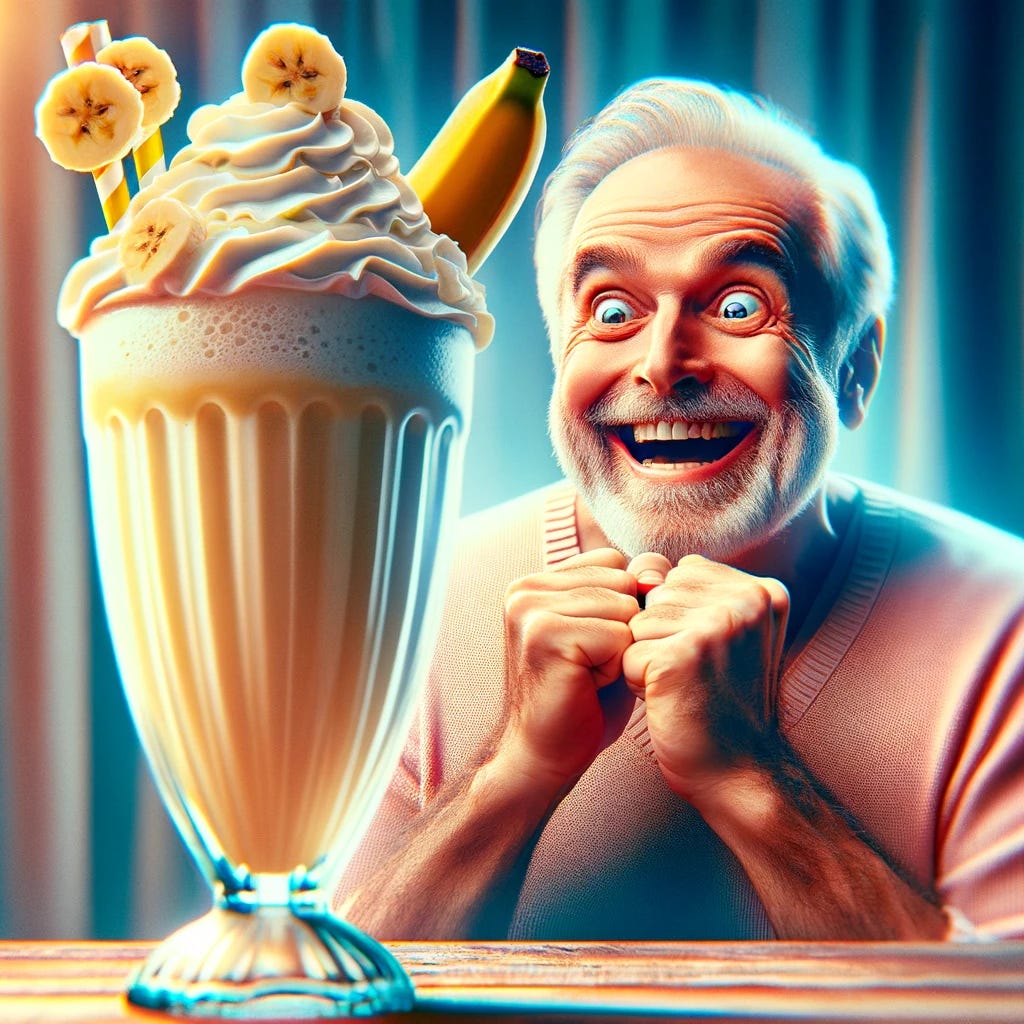In Touch With The Inner Adult
When I was a child, I spake as a child, I understood as a child, I thought as a child: but when I became a man, I put away childish things. 1 Corinthians, 13:11
Great care needed here. One of those instances where a fellow has to make it perfectly clear that Observation Is Not Necessarily Criticism.
A person – writer, comedian, broadcaster say, sees — or thinks they see — a trend, a mode, a manner, a style, and they remark upon it. But the remarking can be read as mockery or disapproval, and those observed take umbrage1.
Example … I don’t know, I’m searching rather wildly here … let me see. Well, in a relatively short stretch of London’s Oxford Street the other day, I counted at least seventeen young people wearing positively enormous puffed jackets. Now, if I were to say publicly somewhere that I found it charming and amusing that anyone might want to present themselves to the world as the bastard child of The Stay-Puft Marshmallow Man and Mr Blobby, I could expect a lot of “Wind your neck down, Old Man Boomer” or, if I were a young standup “It’s a lifestyle choice, bro. Like your lame Hawaiian shirt.” People are prickly these days, which is one of the symptoms that inclines Doctor Social Media so readily to pronounce pervasive cultural narcissism amongst the population. Along with snowflakery and triggering comes a strong hypersensitivity to criticism or, most painfully, scorn. Even if criticism or scorn were never there, just a friendly taking note.
I should not have written “People are prickly these days”; I should have written “We are prickly these days”, for I certainly can’t escape the charge if charge it is. And that counts for all that follows, which concerns … well, let’s go back a bit.
Spoiled for lack of choice
If I return to my childhood for a moment, it’s not to raise it up as a better time, but rather to highlight the changes that have come about.
Sweetshops
TV channels
Top-shelf and sex-shop itemries
1. There aren’t really any sweet shops now (candy stores for my American readers) because every shop is a sweet shop. Supermarkets no longer have shelves and counters dedicated to confectionery but whole aisles. Petrol stations offer every major brand that could be hoped for. Corner shops sell more varieties of chocolate bar and crisps than they do bread, eggs or milk; for sweets and snacks are the new staple.
2. I grew up with just three TV channels. Which gives me an opportunity to tell you a story about the late Queen Elizabeth, the Queen Mother. Her faithful Private Secretary Martin Gilliat (a wonderful old buster on whom a whole Substack could be devoted) told me that when she had a new television installed at Clarence House, he demonstrated to her an exciting modern feature.
“You see that small grey item on the occasional table, just next to Your Majesty’s gin and Dubonnet?”
“Oh, yes, I do, Martin. What can it be?”
“Well, if you look at your new television, you will see that there are no dials or knobs on it.”
“Oh no! They’ve forgotten the dials and knobs!”
“Well, no, ma’am, this device does away with dials and knobs. No need to get up to change the channels. It’s called a ‘remote control’. You see, if I press button one, thus, on comes BBC 1. Button two, BBC 2 and lastly, button three, ITV. You see?”
“My word, how clever!” The smallest of pauses. “I still think it’s easier to ring.”
3. I haven’t noticed pornographical magazines in newsagents recently. Not that I earnestly search them out. But I’m a tall man, and I’m pretty sure that if my eye had lately met an Asian Wife or some species of Hot Twink as I looked about for a scratchcard and Daily Star, I would remember them. Not, to be honest, that I go in for scratchcards or buy newspapers. Not even the Daily Star, which is probably the least annoying available. I am often in Soho, though, where believe me it is easier to find a ginanggang than a girlie-mag, and Bánh mì buns are far more easily sourced than Ben Wa balls.
When Mick Jagger wrote it, it was true that you couldn’t always get what you wanted. But assuredly, this is no longer the case.
Sweets to the sweet
I was born the year Sugar Puffs were launched upon the world. My generation was exactly the one to whom sugary goods first aimed themselves in advertising posters, cereal packets and bubblegum wrapper giveaways. I have the teeth to prove it. Or rather, I have the gaps in my teeth to prove it. We crowded the sweetshops, pooling our coins. Four Fruit Salads or Blackjack chews to a penny, two rice paper and sherbet flying saucers to a penny, sixpence for a quarter pound of pink foamy shrimps.
The German confectioner Haribo (not yet the marked presence in Britain the company is now) had a slogan: “Haribo macht Kinder froh” - Haribo makes children happy. The English version was “Kids love it so - the happy world of Haribo.” Of course. Golden gummy bears and bright, chewy, sugary treasure for happy, happy children.
We had comic books - the brightly illustrated adventures of magical figures with amazing gifts: fire, ice, flight, invisibility, elasticity, strength - superheroes with superpowers. These made children happy too.
The greatest treat of all for children was a MILKSHAKE.
Dr Who, What and How
And on television, the very day after John F. Kennedy was shot and killed in Texas, the BBC gave us the wonderful and mysterious Dr Who! My six-year-old self had never wriggled and jiggled with such delight at anything. Time travel!
The opening episode over, how could we wait for next week? My mother was firm. Bedtime. The wooden cabinet with the tiny grey screen that called itself a television set was wheeled away, and its mahogany doors closed. One small bowl of Sugar Puffs, and don’t forget to brush your teeth. With Punch and Judy toothpaste. For kids.
… in Soho … believe me it is easier to find a ginanggang than a girlie-mag, and Bánh mì buns are far more easily sourced than Ben Wa balls.
Then there was the footwear. Sometimes, we’d run around in what we called gym shoes, tennis shoes or plimsolls, all intended for some form of athletic performance. The moment we were out of school uniform, we dived into our holiday play clothes. On dreaded special occasions, the parents would slick down a wayward fringe or kiss curl and force us into proper trousers, shirts and even a smartingly shameful blazer and tie combination. But mostly we dressed for comfort, ease, and leisure. There again, we were kiddywinks, so I think we can be forgiven.
The day I turned seven, my mother took me as a birthday treat to see A Hard Day’s Night. The cinema was packed with children - with the girls screaming with the utmost intensity whenever a Beatle appeared. I remember my mother shaking her head in amused puzzlement and doing her very best to make it look as if she was enjoying herself. She liked the scenes with Wilfrid Brambell, who played the ‘very clean’ grandfather.
Piercing the veil
Grownups though. Grownups had different music, different food, different clothes, different books, different films, a different language, different everything.
They watched their films, and we watched our films, from Chitty Chitty Bang Bang to Star Wars, from Willie Wonka & the Chocolate Factory to Superman. Once the local cinema stopped exhibiting them, that was it, of course, no chance of ever seeing them again until finally, after a few years, they might be screened on television. We had no VHS or Betamax recorders; the only Blockbusters we knew was run by Bob Holness.2
The time would come when we would pass through the veil that separated childhood from adulthood. While in that liminal space, we began to imitate the grownups. The tallest boy with the deepest voice – usually me – would be dared to go to the newsagents. Hard-to-obtain magazines would be shared. I need go no further. It was all rather terrifying.
Almost as eye-watering and dizzy-making were the experimental forays into tobacco smoking and the first swiggings from Daddy’s whisky bottle. But we were teenagers, it was all naughty but natural. Soon, we would be driving, going into pubs, voting; it was time, in Disney-speak, to drop Woody and Buzz back into the toybox and close the lid.
And we more or less did. We morphed from schoolkids into students. From students into young people. We got jobs. We booked holidays and organised mortgages for ourselves. We put away all childish things. We…
Back to the future
But wait — somewhere, somehow, we started to look not forward to more maturity but back to … to what? It was partly a bonding kind of nostalgia. Remembering Blue Peter presenters and the Banana Splits (Tra la lah, tra-la-la lah); vamping on the qualities of Spangles, Aztec Bars and Curly Wurlys was a popular standup routine, let alone a common conversation down the pub. People began to confess that they had kept their Marvel and DC comics from long ago. And were reading them again. Macdonalds opened more and more “restaurants” all over Britain. Grownups – real voting, driving adults – could be seen everywhere sucking down milkshakes and gorging on soft, pappy meat discs smeared with sugar-laden special sauce. It wasn’t too long before Dr Who returned. Most of its fans appeared to be in their thirties and forties. Grownups – real, voting, driving adults – could be seen dressing up for Hallowe’en, wearing, inexplicably, not witches and ghouls outfits, but Spiderman and Wonderwoman costumes, scarfing down the Reese’s Peanut Butter Cups that the householders had intended for real children.
Almost as eye-watering and dizzy-making were the experimental forays into tobacco smoking and the first swiggings from Daddy’s whisky bottle
If you like thinking in terms of these kinds of demographics, you could say, I suppose, that the Baby Boomer generation - the key age group for advertisers when they were children - was still under the spotlight now that they (we) were grown up. We became the yuppie generation, and everything that was once a treat or childish indulgence for our parents could now be an ordinary daily staple for us. We really could have it all. Channel Four arrived, then Five, and suddenly, there was a channel for every day of the year. The kinds of clothing children once only wore in the garden or on the beach became acceptable everywhere. Adult entertainers proudly revealed their comic book collections and train sets. Onesies, sleepovers, marshmallows, rereading Harry Potter twice a year, and Cocopops 24/7, pretty please, with a cherry on top, and I won’t take medication unless it comes in the form of a gummy, so there.
Of course, this was all led by Americans and the supreme influence over fashion and taste they wielded over us, deriving from the not-so-very-soft power of their movies, music and TV. Five-star hotels in London like Claridge’s and the Savoy used to expect all their guests and visitors to wear, if male, at the very least a jacket and tie. But by the mid-80s, the kind of guest they most valued - Steven Spielberg or George Lucas, say, that category of person – would wander into the reception area attired in sports and leisure wear: a baseball cap, tracksuit top, t-shirts, jeans and running shoes. Would the once fierce gatekeepers in their tall hats and gold shoulder braid throw them out? Hardly.
That same Spielberg and Lucas, meanwhile, in their day jobs, had lit the blue touchpaper that would end with Hollywood erupting in a fountain of brightly coloured superheroes.
Haribo in Germany made a crucial alteration to their slogan; it now went “Haribo macht Kinder froh – und Erwachsene ebenso” – Haribo makes children happy, and grownups too. In English, it became “Kids and grownups love it so, the happy world of Haribo.” [my italics].
The word “infantilism” or its cognates rings as snootily judgmental in some ears, no matter how far that may be from the intent, so I have eschewed its use (until this paraleptic moment). No one minds being called childlike – but childish?
Getting younger and younger every day
“It took me four years to paint like Raphael, but a lifetime to paint like a child.”
So said Pablo Picasso. Or so the internet says he said.
But can you have the pleasures of childhood without the innocence? When you know so much more and have felt and suffered so much more? Once you have gone through the door marked puberty, can you turn back? When a knowledge, experience and understanding (however partial) of cruelty, meanness, honour, dignity, abuse, decency, duty, love, pretence and betrayal is yours, can you really prefer Thor: Love and Thunder to Wings of Desire? Red Dead Redemption to Three Colours: Red?
Of course you can, you cry! We can shuttle between identities, ages, propensities, preferences, penchants and peccadillos all the time. As instance:
This evening: after the opera, a plate of olives washed down by a martini. Decant the ’82 Cheval Blanc and enjoy skate wing nappé in brown butter and capers, allowing a little room for Roquefort and grapes to follow, but tomorrow – send out for a Big Mac, fries and strawberry shake, sink deep into the sofa and … Avengers, Assemble.
Today: into the office you go. Suit, tie, best shiny shoes and a freshly shaven chin. Tomorrow, the hoody, the Russell Athletic t-shirt, the tracky bottoms and the Nikes.
Today Oppenheimer, tomorrow Barbie. From Dr Who to Doctor Mabuse. Chess, to GTA 4. Fruity vape to Havana cigar. From Frozen to Fidelio.
It’s not difficult, Stephen. We can oscillate between our profound grownup savoury, serious selves and our shallow sugary, fun-loving silly selves. We really can have it all. No, not difficult at all. It’s child’s play.
Mick was exactly wrong. You can always get what you want. But even if you try, you can’t always get what you need…
… erupting in a fountain of brightly coloured superheroes.
But while we’re at it, what is so great about maturity, seriousness, and so-called “grown-up” thinking and living? Mortgages, lawnmowers, pompous and fruitless debates about Putin and Trump, boredom, garden centres, theories, pursed-lip disapproval, paternalist tub-thumping, old values, elastic-waisted trousers, terrible jokes, Brussels sprouts…
George Orwell wrote in Nineteen Eighty-Four, ‘If you want a picture of the future, imagine a boot stamping on a human face – forever.’
Maybe a more accurate (and equally terrifying) prophecy would be, ‘If you want a picture of the future, imagine Veruca Salt stamping her foot and crying “I want it now!”’– for ever.’
I am neither pushing the virtues of adultishness nor the vices of childishness. Just noticing that we seem to be clinging on to childhood and its appurtenances and resisting the blandishments of adulthood for the first time, surely, in our history.
Some might say this means abdicating responsibility, but have previous generations of oh-so-adult grownups really demonstrated convincing signs of deep and admirable responsibility? If being adult means turning the continents into landfills and the oceans into soups of plastic while consuming without thought for the morrow, perhaps the dawning of the Age of the Kidult is not so very terrible after all.
Sadly, however, I think I look better in a tweed jacket than in a hoody, and oxblood brogues suit me better than Converse All Stars.
And the sight of me in a onesie … banish the image from your mind now, or you will never know a moment’s peace again.
Thank you for being here. Until our next merry meeting… goodbye.
… which always sounds like an Edwardian lady’s drug of choice. Dear Great Aunt Belinda always took a tincture or two of umbrage in her tea – for her nerves, you understand. The effect was powerful. She would giggle until her teeth fell out.
Fun fact. Bob Holness was the second man ever to play James Bond. It was in a South African radio production of Moonraker. The first actor in the role was Barry Nelson, who played “Jimmy” Bond, an American spy who worked for the Combined Intelligence Agency, so with all due respect, that hardly counts.









Of all the “celebrity” writers on Substack, you understand this platform better than most. Excellent writing!
My goodness, that anecdote about the Queen Mother and the television remote control had me laughing in the middle of a meeting. 😂